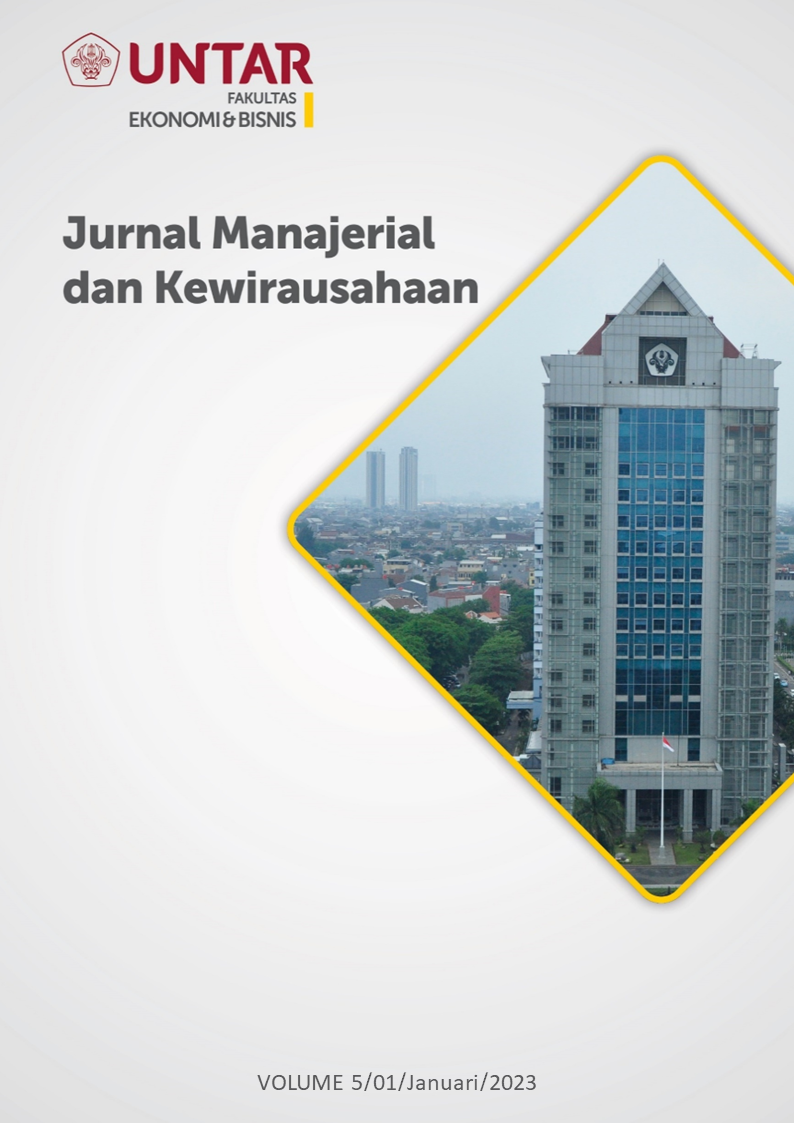Faktor-Faktor yang Memengaruhi Sikap Keuangan pada Generasi Z di Jakarta
Main Article Content
Abstract
Program Studi Manajemen, Fakultas Ekonomi dan Bisnis, Universitas Tarumanagara Jakarta
Article Details
Section

This work is licensed under a Creative Commons Attribution-NonCommercial-ShareAlike 4.0 International License.
This work is licensed under a Jurnal Muara Ilmu Ekonomi dan Bisnis Creative Commons Attribution-ShareAlike 4.0 International License.,/p>
References
Adiputra, I. G., & Patricia, E. (2020). The effect of financial attitude, financial knowledge, and income on financial management behavior. In Tarumanagara International Conference on the Applications of Social Sciences and Humanities (TICASH 2019), 107-112. https://doi.org/10.2991/assehr.k.200515.019
Arifin, A. Z., Kevin, K., & Siswanto, H. P. (2017). The influence of financial knowledge, financial confidence, and income on financial behavior among the workforce in Jakarta. MIX: Jurnal Ilmiah Manajemen, 7(1), 37-47. https://doi.org/10.22441/jurnal_mix
Badan Pusat Statistik. (n.d.). https://www.bps.go.id/istilah/index.html?Istilah_page=4.
Dew, J., & Xiao, J. J. (2011). “The financial management behavior scale: Development and validation”. Journal of Financial Counseling and Planning, 22(1), 43.
Dwiastanti, A. (2015). “Financial Literacy as the Foundation for Individual Financial Behavior”. Journal of Education and Practice, 6(33), 99-105.
Godwin, D. D., & Carroll, D. D. (1986). “Financial management attitudes and behaviour of husbands and wives”. Journal of Consumer Studies & Home Economics, 10(1), 77-96.
Grable, J. E., Park, J. Y., & Joo, S. H. (2009). “Explaining financial management behavior for Koreans living in the United States”. Journal of consumer affairs, 43(1), 80-107.
Herdjiono, I., & Damanik, L. A. (2016). “Pengaruh Financial Attitude, Financial Knowledge, Parental Income Terhadap Financial Management Behavior”. Jurnal Manajemen Teori dan Terapan, 9(3), 226-241.
Huston, S. J. (2010). “Measuring financial literacy”. Journal of consumer affairs, 44(2), 296-316
Ibrahim, M. E., & Alqaydi, F. R. (2013). “Financial literacy, personal financial attitude, and forms of personal debt among residents of the UAE”. International Journal of Economics and Finance, 5(7), 126-138.
Johnson, E. & Sherraden, M.S. (2007), “From financial literacy to financial capability among youth”, Journal of Sociology and Social Welfare, Vol. 34 No. 3, pp. 119-146
Kholilah, N. A., & Iramani, R. (2013). “Studi Financial Management Behavior pada Masyarakat Surabaya”. Journal of Business and Banking,3(1), 69-80
Lumpkin, J. R. (1985). “Validity of a brief locus of control scale for survey research”. Psychological reports, 57(2), 655-659
Marsh, B. A. (2006). “Examining the personal finance attitudes, behaviors, and knowledge levels of first-year and senior students at Baptist universities in the state of Texas (Doctoral dissertation, Bowling Green State University”. OhioLINK Electronic Theses and Dissertations Center. http://rave.ohiolink.edu/etdc/view?acc_num=bgsu1151189375.
Martinez, L. V. & Andal E. Z. (2022). “Relations of Financial Literacy and DecisionMaking Skills to Teacher’s Financial WellBeing and Professional Qualities”. International Journal of Accounting, Finance and Education, 1, 39-54.
Mien, N. T., & Thao, T. P. (2015). “Factors Affecting Personal Financial Management Behaviors: Evidence from Vietnam”. In Proceedings of the Second Asia-Pacific Conference on Global Business, Economics, Finance and Social Sciences.
Nababan Darma & Isfenti Sadalia. (2013). “Analisis Personal Financial Literacy dan Financial Behavior Mahasiswa strata I Fakultas Ekonomi Universitas Sumatera Utara”. Media Informasi Manajemen Vol 1 No.1:1-16.
OCBC NISP. (2022). “Financial Fitness Index 2022 – Highlights”. https://www.ruangmenyala.com/resources/guidebook/financial-fitnessindex-2022-highlights-2.
Perry, V. G., & Morris, M. D. (2005). “Who is in control? The role of self-perception, knowledge, and income in explaining consumer Financial behavior”. The Journal of Consumer Affairs, 39(2), 299-313
Robb, C. A., & Woodyard, S. (2011). “Financial Behavior, Financial Knowledge, Financial Satisfaction”. Journal of Family and Economic Issues, 22(1), 60– 70.
Rotter, J. B. (1966). “Generalized expectancies for internal versus external control of reinforcement. Psychol”. Monogr. 80, 1–28. doi: 10.1037/h0092976
Sam, P. A., Frimpong, S., & Kendie, S. (2022). “Personal finance behaviour: a reasoned action approach”. International Journal of Social Economics, (ahead-of-print)
Scott, R. H., III. (2010). “Credit card ownership among American high school seniors: 1997-2008”. Journal of Family and Economic Issues, 31(2), 151-160
Shih, H. M., Chen, B. H., Chen, M. H., Wang, C. H., & Wang, L. F. (2022). “A Study of the Financial Behavior Based on the Theory of Planned Behavior”. International Journal of Marketing Studies, 14(2), 1.
Vieira, K. M., Potrich, A. C. G., & Bressan, A. A. (2020). “A proposal of a financial knowledge scale based on item response theory”. Journal of Behavioral and Experimental Finance, 28, 100405

